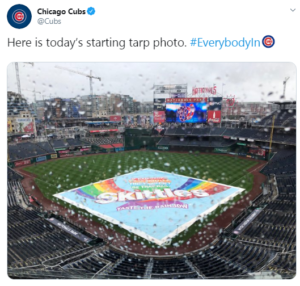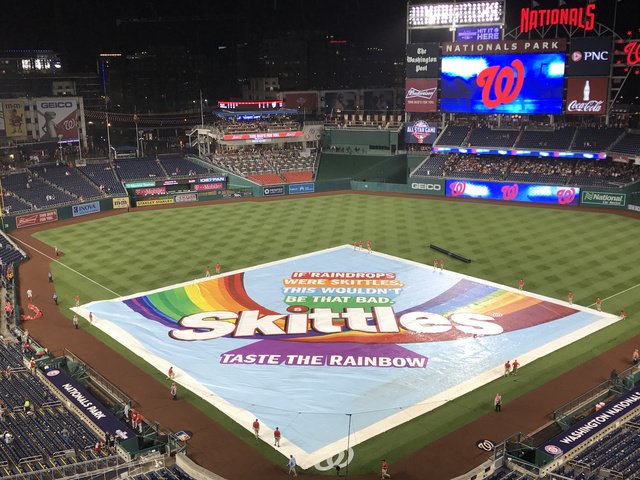If a brand is going to spend advertising dollars, no matter how insignificant it may be to the overall advertising budget, isn’t it important to monitor? This case study highlights how one brand missed a potential opportunity by not engaging in an organically driven conversation where they were the focus. It’s a great example of how social listening can find unique opportunities to shine.
Rain, Rain, & More Rain
Last year, the Chicago Cubs were in an odd place – their schedule was intense, and made more intense by a rescheduled series with the Washington Nationals. Cubs fans were already unhappy with this change, so emotions ran high leading into the weekend – their frustration was palpable before the first pitch was thrown.
Enter rain. Lots of rain. For the entire weekend. And with each rain delay, the tarp was pulled out over the infield. The Skittles logo was prominently displayed, along with their iconic rainbow.

As a marketer, I was giddy with anticipation – surely Skittles was going to see this and do….something. I waited for Skittles to join the conversation.
But nothing happened. All weekend, not a peep from the brand.
Of course, advertising on a MLB rain tarp is the least of the brand’s advertising focus, but Skittles had an opportunity to engage with an organic social situation. While it’s not typical for a rain tarp to generate so much buzz, it would be good practice for the brand to monitor relevant keywords because with social conversations, you just never know.
What to do when the unexpected happens
This wasn’t an opportunity for direct ROI to come from the campaign, but there was a chance for the brand to gain some exposure and engage with consumers.
- At the minimum, join in the conversation somehow. Commiserate with the Cubs fans, offer weather updates, ask questions – just engage with the current conversation. MLB fans seem to enjoy friendly banter on Twitter – take advantage of that.
- Some quick research to get the back story on this series may have generated engagement ideas – try a “rain delay” giveaway – encourage Cubs and Nats fans to guess how long the delay would be – the person coming the closest gets some free Skittles swag.
- Engage with the Cubs’ Twitter account to cross promote. Offer coupons or other giveaways that are small yet something people would get a kick out of.
I realize that these ideas may be difficult to execute quickly and off the cuff, and maybe I’m spoiled by fast food and MLB Twitter, both of which do a great job of reacting to spontaneous situations. Their engagement could have been entertaining and a win for the brand.
Key Takeaways
Social situations, whether they’re handled well or a missed opportunity, can spark ideas for others. Below are some tips for monitoring campaigns that can be effectively incorporated into marketing strategy:
- Monitor ALL advertising/marketing campaigns, no matter how “small” they may be. If it’s worth spending money on, it’s worth monitoring.
- Incorporate appropriate search terms to monitor “low action” advertising investments, no matter how insignificant you think they may be. There is no way Skittles could have predicted “Tarpgate” but employing listening queries may have alerted the brand to what was happening and allowed them to engage in an organically driven conversation.
- Watch for spikes in conversation & set up threshold alerts, whether as part of the overall listening program or as a subset of it.
- In this instance, the volume of conversation was likely not enough to set off alerts for such a large brand; however, when several Twitter users tagged the brand in quick succession, it could have triggered a reason to take a quick look at what was happening.
- Many platforms offer alert options for specific search queries and/or terms. Grouping keywords into a cloud that is tied to an alert can quickly let the social media team know that something may be brewing.
- Determine potential strategies/actions before something happens
- As part of the team’s strategy, determine an action plan for spikes in conversation, both positive and negative. In this case, there’s not much to work with – a tarp isn’t exciting or typically something people talk about, but taking some time to study rain delay conversations across baseball fans might spark some ideas. As an example, the Toronto Blue Jays & Chicago White Sox (Link: https://twitter.com/BlueJays/status/1129844084368138243) played a virtual game of Connect 4 on their Twitter accounts during a rain delay. Simple, but fun and engaging.
- Empower social media managers to be flexible. Look to other accounts for inspiration and create a playbook for this type of situation, similar to ones created for crisis intervention. Trust the staff managing social media to come up with spontaneous engagement options depending on the situation as it happens.
The challenge with social marketing is that brands no longer own the conversation; consumers drive conversations and often times they take an unexpected turn. Marketers need to be nimble and ready to react to spontaneous situations. Not only does it help boost the brand, but it can also be efficient in supporting advertising dollars, thus potentially increasing ROI.
We’d love to hear your examples of engagement strategies that went beyond traditional messaging. Please share your stories and examples in the comments.
Marianne Hynd is the Director of Operations at the Social Media Research Association, a global trade organization dedicated to forming a community of researchers who aim to define & promote best practices and share ideas to help enhance the effectiveness and value of conducting research using social media.



This was a very interesting read, and dead on point. Hopefully others will learn from this missed opportunity. This example should be included in the SMS curriculum.
Thanks for your suggestion, Joe! The education team will definitely take that into advisement.